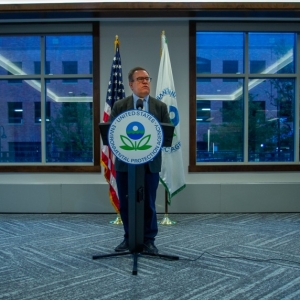The Stream, October 22, 2020: Nepal’s Rice Farmers Are Breaking Covid-19 Protocols To Find Work
YOUR GLOBAL RUNDOWN
- Water shortages and economic stress have caused Nepal’s rice farmers to illegally seek work in India.
- Loosened federal environmental protections allow a mining company to move forward on a project that could drain wetlands in Georgia.
- Native American tribes are asking a federal judge to shut down the Dakota Access Pipeline.
- A rural community in Alaska without running water sees a spike in Covid-19 cases.
A new report suggests that the use of groundwater could solve water scarcity challenges in some parts of the world.
“It’s a resource with a huge amount of potential.” – Jude Cobbing, who lead a new study on how groundwater is managed in India, Bangladesh, Nepal, Nigeria and Ghana. Researchers say that, if used properly, groundwater could provide water to underdeveloped nations during a time where climate change has accelerated water scarcity, Reuters reports. Groundwater makes up about 30 percent of the planet’s freshwater but largely goes unused in some regions of the world, like sub-Saharan Africa. A coordinated effort to use that water, where it is available, could help countries achieve global, sustainable access to water and sanitation by 2030.
THE LATEST WATERNEWS FROM CIRCLE OF BLUE
2020 Election: Water Decisions Pepper State and Local Ballots – The legal rights for rivers and municipal financing of sewer improvements are some of the issues being presented to voters.
In Pakistan, Pandemic Derails Water, Sanitation, and Hygiene Work – Government focus on Covid comes at the expense of other public health projects.
Native American Tribes Are Once Again Asking A Judge To Shut Down The Dakota Access Pipeline
The Standing Rock Sioux and other Native American tribes have asked a federal judge to halt operations of the Dakota Access Pipeline after an appeals court overturned United States District Judge James Boasberg’s shutdown order earlier this year, Al Jazeera reports. If oil from the pipeline were to spill into the Missouri River north of the Standing Rock Reservation, the tribes fear it could pollute their water supply. The tribes are now asking Judge Boasberg to stop the pipeline while the legal battle plays out.
TODAY’S TOP STORIES, TOLD IN NUMBERS
60 PERCENT
Laxmi Kant Mishra, Narainapur’s crisis management chief in Nepal, said water shortages are to blame for the loss of around 60 percent of the country’s rice crop this year and that farmers are risking breaking Covid-19 protocols by going to India to find work. Reuters reports that climate change has caused extreme drought in Nepal for the last few years. Loss of crops from water scarcity, in tandem with the economic impact from the coronavirus pandemic, has left many farmers struggling to get by. To combat the lack of water, the U.N. Food and Agriculture Organization has suggested rice farmers should adopt varieties of their crops that are drought-tolerant and try new practice techniques that use less water.
700 PEOPLE
Without reliable running water, a rural Alaskan community of only 700 is struggling to implement sanitation measures to prevent the spread of Covid-19, Alaska Public Media reports. Since the beginning of October, 24 cases of the virus have been confirmed—one of the worst outbreaks in the Norton Sound Region. Sean Lee, the Sanitation, Engineering and Construction Project Manager for Norton Sound Health Corporation’s Office of Environmental Health said most of those cases can be linked to inadequate water for handwashing. Lee’s department has worked to install more handwashing stations in homes throughout the region using two buckets, a copper faucet and a foot pump.
ON THE RADAR
The Twin Pine Minerals mining company said they are moving forward with plans to dig more minerals without a permit under the federal Clean Water Act just off of the Okefenokee Swamp’s wildlife refuge, reports the AP. The wetlands are no longer federally protected after the Trump administration’s rollback of environmental regulations, the Army Corps of Engineers said. Conservation groups vehemently oppose the project, which they say could cause irreversible damage to the habitats of several protected species. The land the Twin Pines project will operate on is half the size of what the original proposal called for and still needs state-level permits from Georgia’s Environmental Protection Division.
Jane is a Communications Associate for Circle of Blue. She writes The Stream and has covered domestic and international water issues for Circle of Blue. She is a recent graduate of Grand Valley State University, where she studied Multimedia Journalism and Women, Gender and Sexuality Studies. During her time at Grand Valley, she was the host of the Community Service Learning Center podcast Be the Change. Currently based in Grand Rapids, Michigan, Jane enjoys listening to music, reading and spending time outdoors.






Leave a Reply
Want to join the discussion?Feel free to contribute!